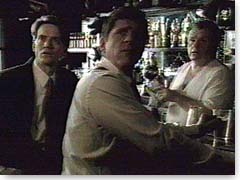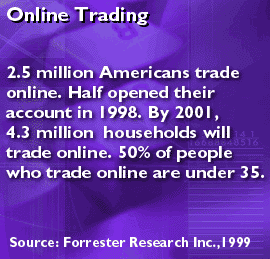|
Broker ads are everywhere
|
 |
May 31, 1999: 1:49 p.m. ET
You can't get away from them, that's for sure. But are online-broker ads a threat?
|
NEW YORK (CNNfn) - Al, the tow truck driver, could never have figured he'd land in so much trouble. Innocently buy an island, pick up some poor broken-down driver, and tell him and the world about it on TV.
Who knew the chairman of the Securities and Exchange Commission would call Al a big fibber?
"But wasn't that just an ad?"
"It certainly was and always has been our intent to do everything to be noticed," John Yost, a partner with Black Rocket, the San Francisco agency that created the spots for Discover Brokerage Direct, said.
Well, in that regard, the commercials -- which portray a tow truck driver who earns enough money buying and selling stocks on the Internet to buy his own island -- have been a smashing success.
So much so, in fact, that regulators are now taking a closer look at ads that imply investors can become overnight millionaires by acting as their own stock brokers.

Al's alter ego, bartender Jack McGee, wows two suits with news of his $43 billion deal
Al piqued Arthur Levitt's interest early in May, when the SEC chairman criticized a proliferation of mass-market, sometimes glib ads for online brokerages. He worried some commercials "step over the line and border on irresponsibility."
But Yost contends consumers understand the difference between television and reality.
"They helped to get Discover Brokerage on the map," Yost said, and his research shows consumers reacted well to them. "They understand the joke." Of course, inadvertently "we may have accelerated the good chairman's scrutiny of this category."
One thing's for sure, the brokerage ads are ubiquitous. The tow truck driver in particular was quite endearing. And they're here to stay. So are Al and his ilk a menace to society? Or is the SEC head just old-fashioned?
A code of conduct "a great solution"
Actually, neither, according to Jay Chiat. Levitt asked Chiat, a respected ad-industry executive, to organize a roundtable on how far online-brokerage advertising can go.
He's not sure that's necessary anymore. "I think he's made his point with the brokerages, and they're reforming," Chiat, one of the founders of the agency Chiat/Day, said.
Levitt "is pretty open-minded," Chiat said. "He just thinks there might be an issue." Some of the ads imply the promise of easy money. And investors may get caught up in the Internet hype and not realize the risks involved in online trading, Chiat said.
The roundtable, slated for the end of June, would bring ad-agency principals, online-brokerage marketing reps and regulators together. It would likely establish a code of conduct for online-brokerage ads, Chiat said. "That would be a great solution."
But Chiat thinks Levitt's comments have already had a cooling effect. He will meet with regulators the first week in June to decide if it's necessary.
Online ads shift emphasis
Al left the airwaves when his ads stopped running in May. But that wasn't a change in focus. There were five ads in what's the first half of Discover's campaign, including another in which a bartender stuns two businessmen in his bar when news of his big deal comes through on TV.
The first half is simply reaching its end. "We did not pull this advertising," Yost insisted. The flight of TV space Discover bought merely ended. He is not sure what the next half of the campaign will look like, he said.
By the time of the speech, online brokerage Ameritrade had already stopped running "Momma's Gotta Trade," the other ad Levitt criticized specifically. But that wasn't connected to his comments. "We have not changed our advertising," a spokesman said.
But online brokerages, eager to avoid a regulatory crackdown, are starting to shift. They're likely to shy away from touting the lure of easy money, moving toward the content of their sites and other selling points.
E*Trade started a new campaign with ad agency Goodby Silverstein & Partners around the time of Levitt's speech. The timing was coincidental, but E*Trade's move point to the direction the rest of the industry may take.
Some of the commercials stress caution, particularly a popular ad "I Quit." An online trader sees his stock spike and rushes to tell his boss he's leaving, only to repent when he realizes the stock crashed.
Of course, it shows him making the money first, one critic pointed out. The tone is still light-hearted compared to mainstream financial ads. And E*Trade, like Ameritrade, is also running attack ads against regular brokers.
But E*Trade says it has shifted its emphasis. At first the battle was to promote the notion of online trading in general. Now that's accomplished, E*Trade thinks, it's time to build brand name and sell the merits of its service.
"It's not a revolution. It's now an evolution," said Lisa Nash, E*Trade's vice president of customer management. "Now that the category sell has happened, we want people to understand within the category that E*Trade is the best place to trade."
Selling the merits of the service
Suretrade.com also started advertising "purely to get the name out there," said Winton Sweum, managing supervisor for its account at ad agency Wieden & Kennedy.
Now its commercials brag of "modern capitalist mavericks" and try and sell the utilitarian and democratic aspects of trading online. Mainly the idea behind the ads, Sweum said, is to sell Suretrade as "a no-pretense brokerage" and highlight the cheap trades.
Ads for other online brokerages are "a little cheeky to say the least," Sweum said. "We're certainly behaving more responsibly than some of the competition."
Sweum said talk of buying islands or winning the lottery don't belong. He was surprised E*Trade came out with quite such a light-hearted new campaign. Levitt's comments probably came at a good time, Sweum said.
"You should speak responsibly about how to participate and with who to participate," Sweum said. "Everyone was a little behind the curve about how things ideally should be."
Brand name mania
But with competition so intense for online-brokerage customers, someone is always looking to bend the rules. Online brokers are scrambling for share of a market that really exist before 1996.

The spate of ads are aimed at establishing vital new brand identities, Ken Clemmer, an analyst with Forrester Research Inc. said. That's often the most important issue for companies that may lack the analysis and branches of an full service broker.
"The holy grail of online [brokerage] advertising is to get normal people to do this," Clemmer said, to trade online. So, far from the stodgy A&E-network-oriented ads for mainstream brokers, these ads appeal to the Ally McBeal crowd, he joked. And they work.
His research shows the online brokerages Charles Schwab, E*Trade, Fidelity and Ameritrade have similar brand awareness for Internet trading as established names such as PaineWebber and Prudential, even with people who don't invest.
"To be in the same group as these offline, established companies is a phenomenal achievement," he said. "It really says this advertising pays off." Discover probably put itself in that group with the tow-truck blitz, Clemmer said, though Forrester did the research before its ads ran.
Up to now it was mired in a second group of online brokerages - that also include Suretrade, DLJ Direct, Datek and Accutrade - that have high awareness with online traders but not with the mass market. "That second group have very little recognition," he said. "These are the people who need to beef up their marketing."
Fair enough, and fair game?
Clemmer expects the advertising to intensify, particularly from that group. "Round 1 is over, but Round 2 is beginning," he said. "Everyone has gotten off the line and they're moving. Now we're getting into the start of the race."
But he thinks the brokerages will back off a little in the content of their ads and happily accept a code of conduct. E*Trade's "I Quit" ad is a sign of things to come, he believes. It deals with the risk of investing without being too explicit, he said.
"This is not a battle worth fighting," Clemmer said. Online brokerages want to avoid having to run boilerplate warnings, a la car commercials, about the risk of trading, he said. Consumers might confuse that with meaning the online technology is risky.
Actually, the SEC may not have much grounds for getting involved in more than an advisory role. "To me, it's silly," said Bert Neuborne, a New York University law professor who has studied online advertising. Levitt's criticism is "the very reason why you never let bureaucrats handle information flow," he said.
The ads are just funny, Neuborne said, not insidious. While the SEC has strict rules about advertising specific securities, Neuborne doubts SEC restriction of general advertising about which online brokerage to pick would stand up to First Amendment scrutiny.
The U.S. Supreme Court tends to throw out attempts to restrict advertising based on the notion the American public is stupid, he said. "What does that say about democracy?" Neuborne asked. "You can't have a people who are sophisticated enough to vote on Tuesday but too unsophisticated to invest on Wednesday."
"It's ultimately an extremely elitist idea, that says that people who went to Yale and have expensive cars are clever enough to invest, but not a tow truck driver."
So as long as they steer clear of basic advertising law and aren't "false or misleading," Neuborne said, no problem. Actually all the better. "The best way to run both a democracy and a free market is a free flow of information to consumers," Neuborne said. "They know better than the government, every time."
Industry looking to consumers
And the industry will likely look to consumers for its defense. Chiat pointed out that nobody has really polled the people watching the online brokerage commercials to see how literally they take them.
"If ads are misleading that's an issue," he said. He doubts too many take the satire of Al literally. "But it's worth finding out."
Of course the implication behind all the online brokerage ads is clear. Use our service and you will make money. But that's not really different from any financial-services advertising. The message is just presented in a different way.
"Everybody's got the same goal. There are a lot of different ways of exploiting that," Yost, whose company created the tow-truck ads said. Al isn't that different from a happy retired couple walking on a beach, secure in their finances, he said. He's just designed to appeal to everyman.
Yost conceded the advertising could give the wrong impression if taken literally. "But most consumers don't consume advertising literally," he pointed out. He also urged for research to see how people react to the ads.
"It's advertising and it's hyperbole and exaggeration to make the point, and consumers understand that."
-- by staff writer Alex Frew McMillan
|
|
|
|
|
 |

|

